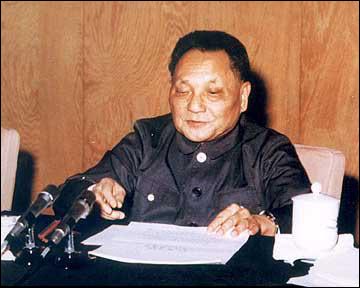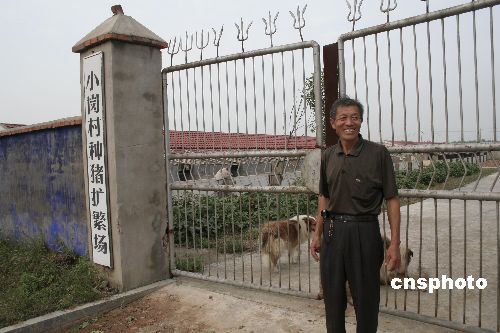The Third Plenary Session of the 17th Central Committee of China's Communist Party (CPC) will be held in Beijing from October 9 to 12, 2008. It is the seventh third plenary session since China's reform and opening up started in 1978. The theme of this year's meeting is countryside reform.
This year marks the 30th anniversary of China's reform and opening up and the meeting is expected to follow the tradition of previous third plenums by introducing significant reforms, in this case focusing on building a new socialist countryside.
Over the past 30 years, every third plenary session of the CPC Central Committee has taken significant decisions concerning economic development and structural reform. Several historic decisions that have fundamentally altered China's development path were taken at these sessions.
"Every plenary session is important,"Ye Duchu, a Party construction expert in the Party School of the CPC Central Committee told Outlook Weekly. "They all help the Party reach a common understanding, formulate theory and define strategy."
According to Ye, after the 14th National Congress of the CPC, the first two plenary sessions of each CPC Central Committee mainly focused on personnel changes, while the third sessions formulated policy and revealed the collective thinking of the leadership.
Zhang Liqun, a research fellow at the Development Research Center of the State Council, said that over the past 30 years, development has been the CPC's top priority. A study of the themes of the each third plenary session shows the Party has been steadily improving its understanding of the modern economy, economic structural reform, and development models, and has adjusted its policies accordingly.
 |
|
Deng Xiaoping at the Third Plenary Session of the 11th CPC Central Committee, 1978. [people.com]
|
According to Professor Chang Xiuze of the Macroeconomic Research Institute of the National Development and Reform Commission, the third plenary sessions of the 11th, 12th, 14th and 16th CPC Central Committees all played a key role in China's structural economic reforms. They mark four stages of structural reform: the start-up stage, the implementation stage, construction of the framework of a socialist market economy, and full implementation of the socialist market economy.
The following is an outline of the development path laid down by the CPC Central Committee at successive third plenary sessions.
The Third Plenary Session of the 11th CPC Central Committee: The historic turning point
This session, held in Beijing from December 18 to 22, 1978, was a turning point in the history of both the Party and China. The session criticized the principle of "two whatevers" ("we will resolutely defend whatever policy decisions Chairman Mao made and unswervingly follow whatever instructions Chairman Mao gave"), while approving a complete and accurate study of Mao Zedong Thought. It held a key discussion on the theme "Practice is the sole criterion for testing truth"; established the watchwords of emancipating the mind, seeking truth from facts, and uniting to face the future; it rectified erroneous slogans and shifted the emphases to socialist modernization and the policy of reform and opening up; issued decisions on promoting agricultural development and set the goals of strengthening socialist democracy and improving the socialist legal system; it also re-evaluated some former State and Party leaders. The session decided to set up the CPC Central Commission for Discipline Inspection.
After the meeting, the second generation of Party leaders formed around Deng Xiaoping. The meeting marked China's entry into a new era of socialist modernization and construction.
Researchers agree that this meeting was a landmark in China's history, lifting the curtain on the period of reform and opening up.
In the following six years, China embarked on major economic structural reforms. The reform started in the countryside with the historic household land-contracting system in Xiaogang Village in south China's Anhui Province. At the same time, industrial and commercial enterprises in the cities also experimented with reforms that gave them greater autonomy in decision-making. "In those days, the whole system was still dominated by the planned economy and the market economy was just beginning to sprout,"said Chang, adding that the key feature of the reforms in the early period was to shrug off the shackles of the planned economy and explore a brand new system.
 |
|
Yan Jinchang, one of the first farmers conducting the historic household land-contracting system in Xiaogang Village of Anhui Province.
|
The Third Plenary Session of the 12th CPC Central Committee: Reform moves from the countryside to the cities
The session opened on October 20, 1984. It unanimously passed the Decision on Economic Structural Reform. The Decision, theoretically based on a Sinicized version of Marxism, recognized the necessity and urgency of speeding up urban economic reforms and set out the nature, direction and goals of the reforms, as well as basic polices required to implement them. It also clarified some contentious theoretical issues regarding the concepts of the commodity economy and the law of value.
"The meeting marked the spreading of reforms from rural areas to the cities, to the whole economy. China's reform passed into its second stage,"said Chang. Before the meeting, the CPC Central Committee carried out extensive research and investigation. For the first time, it was clearly stated that China's socialist economy was not a planned economy per se, but a planned commodity economy based on public ownership. That was a major breakthrough in Marxist Political Economy under the circumstances, and at that time.